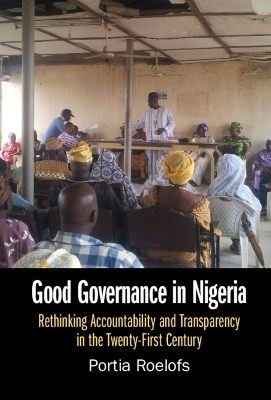
Good Governance in Nigeria
Cambridge University Press (Verlag)
978-1-009-23542-6 (ISBN)
Drawing on original fieldwork in Nigeria, Portia Roelofs argues for an innovative re-conceptualisation of good governance. Contributing to debates around technocracy, populism and the survival of democracy amidst conditions of inequality and mistrust, Roelofs offers a new account of what it means for leaders to be accountable and transparent. Centred on the rise of the 'Lagos Model' in the Yoruba south-west, this book places the voices of roadside traders and small-time market leaders alongside those of local government officials, political godfathers and technocrats. In doing so, it theorises 'socially-embedded' good governance. Roelofs demonstrates the value of fieldwork for political theory and the associated possibilities for decolonising the study of politics. Challenging the long-held assumptions of the World Bank and other international institutions that African political systems are pathologically dysfunctional, Roelofs demonstrates that politics in Nigeria has much to teach us about good governance.
Portia Roelofs is Lecturer in Politics at King's College London. She was previously the Junior Research Fellow in Politics and Political Thought at St Anne's College Oxford and an LSE Fellow in International Development. She has spent time as a visiting scholar at the universities of Ibadan and Maiduguri, and the Institute Français de Recherche on Afrique – Ibadan. She has published in African Affairs, the Journal of Modern African Studies, Governance, Oxford Development Studies and Review of African Political Economy.
Introduction: competing conceptions of good governance; 1. Contested legacies of good governance; 2. Good governance, what's not to love? The Lagos model in Lagos, Oyo and Ekiti states; 3. Be accessible! Accountability, performance and the politician who is 'always in a meeting'; 4. Theorising accountability as accessibility: communication, social sanctions and the limits of principal-agent models; 5. Transparency in people: information, cabals and the politics of hidden networks; 6. Socially embedded good governance: the public-private divide, out-of-office politicians and 'personal' politics in Africa; Conclusion: what Nigeria can teach us about good governance: from socially embedded governance to twenty-first-century democracy.
| Erscheinungsdatum | 03.04.2023 |
|---|---|
| Zusatzinfo | Worked examples or Exercises |
| Verlagsort | Cambridge |
| Sprache | englisch |
| Maße | 159 x 235 mm |
| Gewicht | 660 g |
| Themenwelt | Geisteswissenschaften ► Geschichte ► Regional- / Ländergeschichte |
| Sozialwissenschaften ► Politik / Verwaltung ► Politische Systeme | |
| Sozialwissenschaften ► Politik / Verwaltung ► Staat / Verwaltung | |
| ISBN-10 | 1-009-23542-7 / 1009235427 |
| ISBN-13 | 978-1-009-23542-6 / 9781009235426 |
| Zustand | Neuware |
| Informationen gemäß Produktsicherheitsverordnung (GPSR) | |
| Haben Sie eine Frage zum Produkt? |


